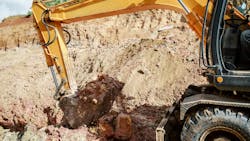The Federal Emergency Management Agency (FEMA) has announced that reconstruction has started for a sanitary trunk main in Puerto Rico to serve the communities of Vistimar, Los Agneles and Loíza Pueblo, in Carolina and Loíza.
The system will be rebuilt with an innovative system that will provide a useful life of at least 50 years to the pipes that carry wastewater to nearby treatment plants. The construction stages follow an allocation of about $8.2 million from FEMA.
“The reconstruction of this sanitary system will have a positive impact in the quality of life of the thousands of residents and business owners in the area, who will be able to count on the potable water they need and deserve,” said the Governor of Puerto Rico, Pedro R. Pierluisi. “This is one of the most comprehensive projects that PRASA, COR3 and FEMA have together, which optimizes our sanitary sewer system while helping protect our natural resources and mitigating future damage.”
The work will benefit an estimated 12,000 customers of the Puerto Rico Aqueduct and Sewer Authority (PRASA), who will have a renovated system that will be able to withstand future atmospheric events. The restoration will be done with a non-invasive method that will avoid excavations in the adjacent communities. CIPP is one of the reconstruction practices already approved for these structures under FEMA's Accelerated Award Strategy (FAASt). To date, the agency has obligated close to $1.2 billion for 44 aqueduct and sewer subprojects thanks to this methodology.
"Within the framework of International Water Day, where the importance of this vital resource is recognized, we see how these works contribute to an adequate and efficient use of water, with optimal materials that guarantee long-lasting productivity,” said the federal disaster recovery coordinator, José G. Baquero. “The residents of the area will benefit from a robust system, even in the face of future events such as Hurricane María.”
For her part, PRASA Executive Director Doriel Pagán Crespo said the project is 20 percent complete and that work is expected to be finished by the third quarter of this year. There are about four kilometers of pipeline that will be built according to the new construction codes and with future emergencies in mind.
“There has been a synchronization, a teamwork, that at the end of the day helps to accelerate projects like these that are for the benefit of our infrastructure and all our customers. To the extent that we have a much more resilient sanitary infrastructure, we greatly reduce the possibility of sanitary overflows, and this has a beneficial impact on the environment,” said Pagán Crespo.
Currently, the public corporation has completed 53 projects estimated at $93 million.
To date, FEMA has allocated over $29 billion in Public Assistance program funds to help Puerto Rico recover from Hurricane Maria.
